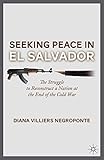Seeking peace in El Salvador : the struggle to reconstruct a nation at the end of the Cold War / Diana Villiers Negroponte.
Material type: TextLanguage: English Publication details: New York : Palgrave Macmillan, 2012.Description: xiv, 244 p. ; 25 cmISBN:
TextLanguage: English Publication details: New York : Palgrave Macmillan, 2012.Description: xiv, 244 p. ; 25 cmISBN: - 9780230120945 (alk. paper)
- Peace-building -- El Salvador -- International cooperation
- Mediation, International
- United Nations -- El Salvador
- United Nations. Observer Mission in El Salvador
- Peacekeeping forces -- El Salvador
- El Salvador -- History -- 1979-1992
- El Salvador -- Politics and government -- 1979-1992
- Construcción de la paz -- El Salvador
- Paz -- El Salvador
- Mediación internacional
- Fuerzas de paz
- 303.6609861
- JZ 5584 N394s 2012
| Item type | Current library | Home library | Collection | Shelving location | Call number | Vol info | Copy number | Status | Date due | Barcode |
|---|---|---|---|---|---|---|---|---|---|---|
 Libro
Libro
|
Biblioteca Juan Bosch | Biblioteca Juan Bosch | Ciencias Sociales | Ciencias Sociales (3er. Piso) | JZ 5584 N394s 2012 (Browse shelf(Opens below)) | 1 | 1 | Available | 00000121520 |
Includes bibliographical references (p. [225]-240) and index,
Introduction -- Theoretical issues in El Salvador's peace process -- Ancient conflicts, modern violence: the causes and context for civil war -- Internal forces struggle to resolve the civil war -- Internal pressures for ending Salvador's civil war -- The United States: protagonist or mediator? -- External influences on the negotiations to end the war in El Salvador -- Introducing the United Nations -- Four critical moments in the negotiations -- Implementation of the Chapultepec Accords: the achievements -- Challenges to the peace accords.
The resolution of the civil war in El Salvador coincided with the end of the Cold War. It would prove to be a test of Soviet willingness to withdraw from support of revolutionary movements in Latin America and Washington's ability to help reconstruct a nation - twenty percent of whose population had emigrated to the United States. Analysis of the decision making in Washington, as well as the outreach to Moscow, is undertaken in conjunction with examination of the internal pressures to end the fighting. To assist in this process, the Salvadoran government accepted the United Nations as a 3rd party mediator. This book examines the work of Alvaro de Soto, the establishment of a UN Truth and Reconciliation Commission, and the peace keeping role of ONUSAL. Each played a critical role in nudging both the government and the FMLN towards peace. However, after two years of negotiations and a decade-long effort to implement the peace accords, this work questions how peace was made and whether it has endured. Are the current levels of criminal violence a consequence of that civil war?


There are no comments on this title.